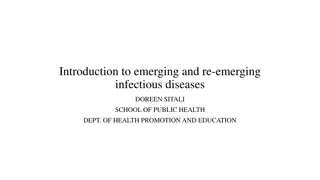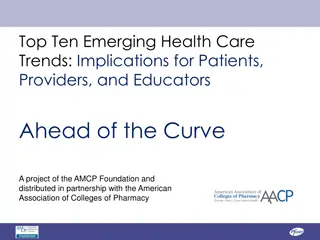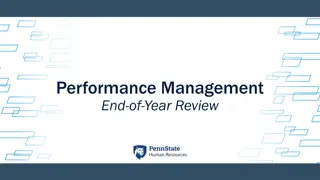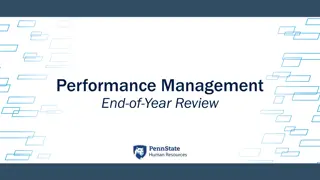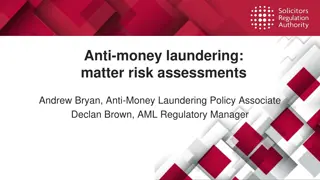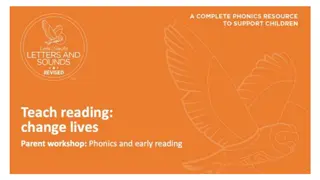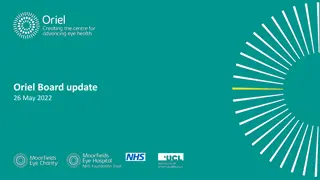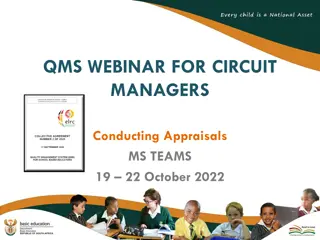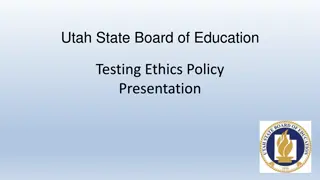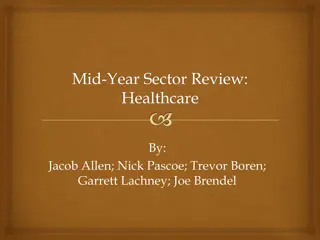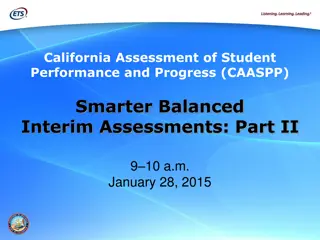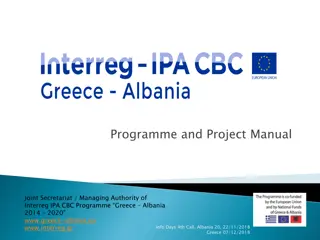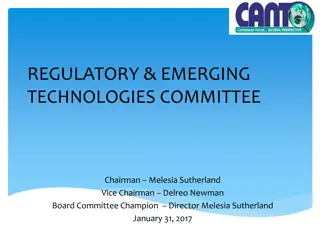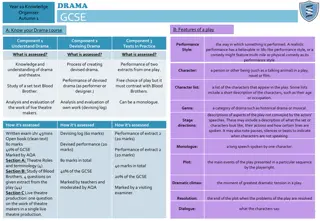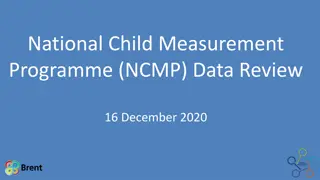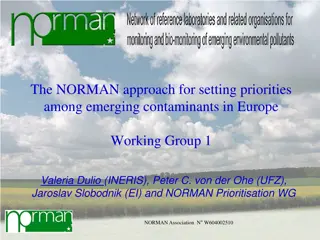Mid-Year Programme Performance Review: Emerging Issues, Trends, and Assessments
The mid-year programme performance review discussed objectives, challenges, opportunities, and trends related to COVID-19 impact, resource utilization, and strategic implications. The meeting aimed to enhance planning, accountability, and transparency, addressing issues like slow implementation, evaluation methods during lockdown, and the potential for not meeting performance targets. Despite challenges, opportunities for new business models, financial prudency, cross-sectoral collaboration, innovation, and governance strengthening were also highlighted.
Download Presentation

Please find below an Image/Link to download the presentation.
The content on the website is provided AS IS for your information and personal use only. It may not be sold, licensed, or shared on other websites without obtaining consent from the author.If you encounter any issues during the download, it is possible that the publisher has removed the file from their server.
You are allowed to download the files provided on this website for personal or commercial use, subject to the condition that they are used lawfully. All files are the property of their respective owners.
The content on the website is provided AS IS for your information and personal use only. It may not be sold, licensed, or shared on other websites without obtaining consent from the author.
E N D
Presentation Transcript
1 Mid-Year Programme Performance Review: Emerging Issues, Trends and Assessments Said Adejumobi, Director Strategic Planning, Oversight and Results Division (SPORD) Q2 APPRM meeting 20th, 21stand 23rdJuly 2020 Addis Ababa, Ethiopia
2 Outline of the Presentation 1. Objective of Q2 APPR meeting 2. Challenges and opportunities for programme delivery in the context of COVID-19 3. Trends and issues emerging from mid-term reports 4. OIOS Audit Recommendations: Implementation status 5. Key Recommendations of UN BoA Audits FY 2019 6. Conclusions
3 1. Objectives of the Quarter 2 APPR Meeting Objective: enhance result-based planning, monitoring and reporting foster the culture of accountability and transparency. Specific objectives take stock of progress made in implementing deliverables during Jan to June and review overall programme performance; and agree on remedial/ course correction measures (if any); review utilization of resources from all funding streams (RB, NEPAD, DA and XB); provide space for identifying concrete areas of cross-sectoral and cross- divisional collaboration; and deliberate on the strategic and programmatic implications of COVID-19
2. Challenges and opportunities for programme delivery in the context o f COVID 19 4 Challenges 1. Slow down in implementation due to travel restrictions (in some case no progress) compounded by recruitment freeze and phased release of RPTC resources 2. Impact on convening and operational functions 3. => Likelihood of not meeting some performance targets 4. Undertaking evaluations during lockdown => methodological shift 5. Slower resource usage - RB and XB - (Travels; Expert Meetings) repurposing / extending agreements for XBs 6. Rolling back the gains of the SDGs and decelerating the Decade of Action
2. Challenges and opportunities for programme delivery in the context o f COVID 19 5 continued Opportunities 1. New business model that deploys technology and ICT for operational delivery 2. Financial prudency and cost efficiency through better use of technology 3. New development paradigm in a COVID 19/ post COVID context / building back better / green recovery 4. Space for cross-sectoral collaboration and partnership within ECA, the UN and other stakeholders (knowledge resources, e.g. KM Hub on COVID-19 5. Push for innovation and creativity in the private sector in business operations 6. Strengthening governance systems in the service of people / health care systems through increased investment in infrastructure
6 3. Trends and issues emerging from mid-term reports A. Some highlights of progress toward results / emerging results Policy direction and uptake for Africa on its response to COVID-19, including policy studies and briefs on the socio-economic impacts of COVID 19 at regional and sub- regional levels, Exit Lockdown Strategies and COVID-19 and cities ; and coordinated regional and global action in support of the continent The Africa Communication and Information Platform (ACIP) for Health & Economic Action Incorporating post COVID 19 recovery plans in AfCFTA national strategies (Sierra Leone, Kenya and Gambia) Strengthened systems of Civil Registration and Vital Statistics (Ethiopia, Senegal, Somalia, South Sudan, Sudan & Burkina Faso) as essential services and enhancing the role of statistics during the COV-19 Pandemic
7 3. Trends and issues emerging from mid-term reports continued A. Some highlights of progress toward results / emerging results Launch of the 2019 Africa Regional Integration Index Leveraging digital technologies through the Pharma Initiative to create access to safe, affordable medicine Effective use of digital learning platforms for capacity development trainings with added advantage of reducing costs and increased women participation Work with Afreximbank to support liquidity relief to the recovery of five African airlines from COVID-19 and in support of a bankable deal for Guinea to support imports and purchase of agricultural inputs to mitigate the impacts of COVID-19 on food security Mali endorsed a Public Budgeting Framework sensitive to Demographic Dividend that will inform the country s 2021 national budget deliberations
8 3. Trends and issues emerging from mid-term reports continued B. Status against performance targets as per the 2020 ABP (by SP) Key: >= 50% < 50% & >=30% Data not provided / available Data available by year end < 30% Not applicable SPs Indicators of Achievement 1 2 3 4 5 6 7 8 9 SP1: MGD SP2: RITD NEPAD SP3: PSFD SP4: ACS SP5: TCND SP6: ACG SP7: SRO-NA
9 3. Trends and issues emerging from mid-term reports continued B. Status against performance targets as per the 2020 ABP (by SP) Key: Data not provided / available Data available by year end >= 50% < 50% & >=30% < 30% Not applicable SPs Indicators of Achievement 1 2 3 4 5 SP7: SRO-WA SP7: SRO-CA SP7: SRO-SA SP7: SRO-EA SP8: IDEP SP9: PISP
10 3. Trends and issues emerging from mid-term reports continued B. Status against performance targets as per the 2020 ABP (by SP) Key observations/Challenges Paucity of performance data Stepwise/ progressive nature of indicators: work starts in Q1 and results begin to emerge in Q3/Q4 Back-loading of deliverables to Q3/Q4 due to travel ban, political instability (WA & NA) and late receipt of RPTC funds constrained data collection efforts/ monitoring visits Some performance data, e.g. volume of intra-Africa trade, only available by end of Q3 or 2020 As at end of Q2, data only available for 56.8% of performance indicators (i.e. 29 out of 51) 50% or more of set targets achieved for 13 out of the 29 indicators for which data is available SPORD assessment incomplete due to unavailability of data Likelihood of more red flags Focused attention required to review and speed up SPs work corresponding to performance indicators flagged and .
11 3. Trends and issues emerging from mid-term reports continued C. Collaboration & joint delivery in Countries of Focus by thematic area 1) National AfCFTA strategies RITD and SROs targeting all CoFs RITD, ACS and ACG targeting Kenya, Burkina Faso and Rwanda (Gender responsive trade policies) PSDFD, RITD, ACS and GPSPD on the impact of COVID-19 on African Ports targeting countries with ports IDEP and RITD on webinars/ Digital Trainings on AfCFTA and e-Commerce targeting all CoFs 2) Macro modelling for sustainable development planning MGD and SRO-WA targeting ECOWAS MGD, PCKMD & ACS targeting all CoFs (IPRT) IDEP and MGD on training on Fiscal policy for Sustainable development targeting all COFs IDEP and MGD Webinars/ Digital Trainings on domestic resources mobilization and macroeconomic planning targeting all CoFs
12 3. Trends and issues emerging from mid-term reports continued C. Collaboration & joint delivery in Countries of Focus by thematic area 3) Policy response to COVID-19 and advocacy MGD, SRO-WA, ACS and TCND (Strategy for Governance of COVID-19 Stimulus Funds) targeting Guinea MGD, SRO-SA and RITD on socioeconomic impacts of COVID-19 and customization of macroeconomic model targeting Namibia 4) Innovative financing PSDFD & TCND on the implementation of the SDG 7 Initiative targeting Angola, Ethiopia, Guinea, Kenya, Senegal, and South Africa PSDFD, MGD and SRO SA on domestic and private resource mobilization targeting Angola 5) Social policy for poverty and inequality reduction PSDFD, RITD, GPSPD and ACS on the review land laws from a gender lens targeting Malawi GSPD, ACS, SRO-WA, and SRO-SA on technical assistance to achieve migration-related targets of SDGs and the Global Compact targeting all CoFs
13 4. OIOS Audit Recommendations: Implementation Status Year 2018 to date, five audits were undertaken by OIOS; 28 recommendations made Africa Hall (2018, 2019 & 2020) (x3) ECA Policy Centers (x1) Streamlining SDGs in ECA Programme of Work (x1) Two (2) recommendations not implemented by deadline & still pending: Developing a Resource Mobilization (RM) strategy for Africa Hall Strengthening capacity of Partnership Resource Mobilization Section (PRMS) by filling vacant posts for the section 13 audit recommendations with deadlines in 2020 in progress/on track Africa Hall 2020 (x8) & Management of Policy Centres (x5) Since 2018 to date, ECA has implemented 13 recommendations. Key ones are: Risk management of Africa Hall project Improved programme management accountability framework Corporate level Enterprise Risk Management Framework (ERMF) Developed advocacy and outreach plan on VNRs
14 5. Key Recommendations of UN BoA Audits FY 2019 Recommendation ECA comments Strengthen oversight of extra budgetary resources, address low utilization. Actual utilization was only 58.58% in 2018 and 60.64% in 2019. ECA takes good note of the recommendation, will take steps to further strengthen the review mechanisms, both in terms on delivery of outputs and financial burn rate. Deadline: ongoing Carry out review, reasons for non-achievement of targets. Target indicators for 5 out of 9 sub- programmes for the biennium 2018-2019 were not met - RITD, PSDF, ACS, TCND, SRO (NA, WA & EA). To further strengthen the planning and implementation of programme/projects ECA is currently revising its Programme Management Manual (PPM) to bring it at par with industry best practices. Deadline: ongoing
15 5. Key Recommendations of UN BoA Audits FY 2019 continued Recommendation ECA comments Work closely with MSs to improve data collection for the SDGs. ECA has compiled indicator-wise data of 54 African countries for 17 goals for 2015 to 2019. No data was collected for any country for 80 indicators, while coverage of countries for many indicators was low. Deadline: ongoing Review reasons for delays in recruitment. ECA in 2019 took 340 days against benchmark of 120 day in completion of the entire recruitment process them HR regularly follows up with all stakeholders of the recruitment process including the Hiring Managers as well as CRC/B/CRP members.HR also adopted a follow-up mechanism of informing the Executive Secretary cases on a weekly basis pending for selection on both paper and in INSPIRA.
16 5. Key Recommendations of UN BoA Audits FY 2019 continued Recommendation ECA comments Improve management of Implementing Partners (IPs) timely disbursement, benefits delivered & refunds timely received. As of 31 Dec 2019, 20 Implementing Partners (IPs) were to refund 68.6% of total amount disbursed The balance amount will be collected or refunded or adjusted based on the agreement as per the advice of the concerned project managers who are overseeing the projects from the respective Divisions. Deadline Dec 2020 ECA takes steps to enhance involvement of Senior Leadership Team for planning and implementing ERM to ensure that ERM is embedded into strategic planning and decision- making. A devoted capacity for risk management is currently being recruited. Deadline: Dec 2020
17 6. Conclusions Building back better in Africa: ECA strategy for integrated response to COVID-19 Strengthen collection of performance data, including evidence Need to ensure systematic and timely implementation of audit and evaluation recommendations Need to step-up and institutionalize ECA s participation in the work of OIBCs with a Whole-of-System Approach Need to operationalize the Decade of Action to deliver the SDGs Engaging and collaborating with RCs/ UNCTs: need for engagement strategy Increased use of technologies for collaboration, policy advice, dissemination of knowledge products, training and engagement with constituencies Alternative and cost-efficient implementation modality to scale up reach and programe impact?
18 Thank you !






